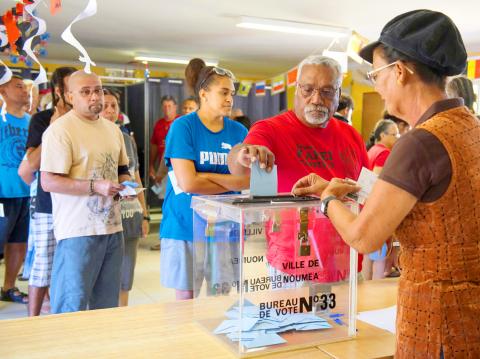The Pacific islands of New Caledonia yesterday voted to remain part of France in an independence referendum that showed support for Paris in one of its many far-flung but strategic outposts.
New Caledonia is home to a quarter of the world’s known supplies of nickel — a vital electronics component — and is a foothold for France in the Pacific where China is increasing its influence.
On the final count, 56.4 percent of voters rejected the proposition that New Caledonia become independent, a clear, but smaller-than-expected victory for loyalists.

Photo: AP
French President Emmanuel Macron expressed his “immense pride that we have taken this historic step together” in a televised address to the nation, adding that it was “a sign of confidence in the French republic, in its future and its values.”
Turnout was high for the vote, at more than 80 percent, but there are fears the referendum could inflame tensions between indigenous Kanak people, who tend to favor independence, and the white population, which has settled since France annexed the islands in 1853.
Several cars were burned and a couple of incidents of stone-throwing were reported late yesterday, local authorities said, but the vote was otherwise peaceful.

Photo: AFP
Tensions in New Caledonia boiled over into ethnic strife in the 1980s, which claimed more than 70 lives. It led to the 1998 Noumea Accord, which paved the way for a steady devolution of powers, as well as yesterday’s referendum and possibly two others before 2022.
“The Kanaks have become aware that they need to show their determination to be free at last,” Alosio Sako, head of the pro-independence movement FLNKS, said after the results were announced.
Polls had forecast a bigger victory — of 63 to 75 percent — for the “no” campaign.
“We’re a short step away from victory and there are still two votes to come,” Sako added, referring to the other two referendums possible under the accord.
Macron had largely stayed clear of the campaign in New Caledonia, but during a visit to Noumea in May, he said that “France would be less beautiful” without the territory.
He also raised concerns over increasing Chinese influence in the Pacific, saying Beijing was “building its hegemony step by step” in the Pacific — suggesting that an independent New Caledonia could be Beijing’s next target.

CHAOS: Iranians took to the streets playing celebratory music after reports of Khamenei’s death on Saturday, while mourners also gathered in Tehran yesterday Iranian Supreme Leader Ayatollah Ali Khamenei was killed in a major attack on Iran launched by Israel and the US, throwing the future of the Islamic republic into doubt and raising the risk of regional instability. Iranian state television and the state-run IRNA news agency announced the 86-year-old’s death early yesterday. US President Donald Trump said it gave Iranians their “greatest chance” to “take back” their country. The announcements came after a joint US and Israeli aerial bombardment that targeted Iranian military and governmental sites. Trump said the “heavy and pinpoint bombing” would continue through the week or as long

TRUST: The KMT said it respected the US’ timing and considerations, and hoped it would continue to honor its commitments to helping Taiwan bolster its defenses and deterrence US President Donald Trump is delaying a multibillion-dollar arms sale to Taiwan to ensure his visit to Beijing is successful, a New York Times report said. The weapons sales package has stalled in the US Department of State, the report said, citing US officials it did not identify. The White House has told agencies not to push forward ahead of Trump’s meeting with Chinese President Xi Jinping (習近平), it said. The two last month held a phone call to discuss trade and geopolitical flashpoints ahead of the summit. Xi raised the Taiwan issue and urged the US to handle arms sales to

State-run CPC Corp, Taiwan (CPC, 台灣中油) yesterday said that it had confirmed on Saturday night with its liquefied natural gas (LNG) and crude oil suppliers that shipments are proceeding as scheduled and that domestic supplies remain unaffected. The CPC yesterday announced the gasoline and diesel prices will rise by NT$0.2 and NT$0.4 per liter, respectively, starting Monday, citing Middle East tensions and blizzards in the eastern United States. CPC also iterated it has been reducing the proportion of crude oil imports from the Middle East and diversifying its supply sources in the past few years in response to geopolitical risks, expanding

Pro-democracy media tycoon Jimmy Lai’s (黎智英) fraud conviction and prison sentence were yesterday overturned by a Hong Kong court, in a surprise legal decision that comes soon after Lai was jailed for 20 years on a separate national security charge. Judges Jeremy Poon (潘兆初), Anthea Pang (彭寶琴) and Derek Pang (彭偉昌) said in the judgement that they allowed the appeal from Lai, and another defendant in the case, to proceed, as a lower court judge had “erred.” “The Court of Appeal gave them leave to appeal against their conviction, allowed their appeals, quashed the convictions and set aside the sentences,” the judges